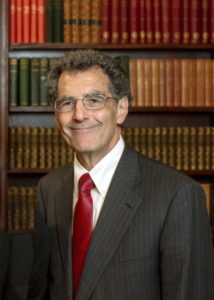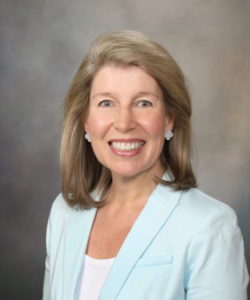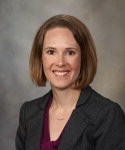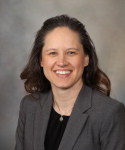2018 Distinguished Mayo Clinic Investigator and Team Science Awards announced
The Mayo Clinic Research Committee announced 2018 recipients of the Distinguished Mayo Clinic Investigator Award and the Mayo Clinic Team Science Award.
Distinguished Mayo Clinic Investigators

S. Vincent Rajkumar, M.D. (HEMO ’99), Division of Hematology, Department of Medicine; Mayo Clinic Department of Laboratory Medicine and Pathology, Mayo Clinic in Rochester; the Edward W. and Betty Knight Scripps Professor of Medicine in Honor of Dr. Edward C. Rosenow, III

Peter Amadio, M.D. (OR '83), Department of Orthopedic Surgery; chair, Division of Orthopedic Research; chief medical officer, Office of Information Security; deputy director, Mayo Clinic Center for Military Medicine; professor of biomedical engineering and orthopedics; Lloyd A. and Barbara A. Amundson Professor of Orthopedics and Biomedical Engineering
Mayo Clinic Team Science awardees

Deborah Rhodes, M.D. (GIM '97), Division of Preventive, Occupational and Aerospace Medicine, Division of General Internal Medicine, Department of Medicine, professor of medicine

Michael O’Connor, Ph.D. (RD '86, Division of Nuclear Medicine, Department of Radiology, professor of medical physics

Carrie Hruska, Ph.D. (BME ’07, R-D ’09, CTSA ’16)
Department of Radiology
Mayo Clinic Rochester

Katie Hunt, M.D. (RBR '09), Department of Radiology, Mayo Clinic in Rochester

Amy Conners, M.D. (RD '08), Department of Radiology, Mayo Clinic in Rochester

"Interpretation and Reporting of Fourier-Transform Infrared Spectroscopy Spectra Using Artificial Intelligence"
Rickey Carter, Ph.D. (HSR ’09), Department of Quantitative Health Sciences, Mayo Clinic in Florida; Joshua Bornhorst, Ph.D. (LABM & PATH ’17), Division of Clinical Biochemistry and Immunology, Mayo Clinic in Rochester; and Paul Jannetto, Ph.D. LABM ’12), Division of Clinical Biochemistry and Immunology, Mayo Clinic in Rochester
About the awards
The Distinguished Mayo Clinic Investigator Award is presented to individuals whose research careers demonstrate evidence great distinction, high distinguished scholarship, creative achievement, and excellence in education and administrative responsibilities.
The Team Science Award recognizes team science: the unique and valuable contributions of different insights, skill sets, and complementary expertise, without which the effort could not succeed.
All of the 2018 awardees were recommended by an enterprisewide committee, approved by the Mayo Clinic Research Committee and endorsed by the Mayo Clinic Board of Governors.
2018 Distinguished Mayo Clinic Investigators
Vincent Rajkumar, M.D., is a consultant in the Division of Hematology, Department of Internal Medicine. He holds joint appointments in the Division of Hematopathology and the Department of Laboratory Medicine and Pathology. Dr. Rajkumar holds a named professorship in medicine as the Edward W. and Betty Knight Scripps Professor of Medicine and is a clinician investigator.
Dr. Rajkumar chaired the Mayo Clinic Myeloma/Dysproteinemia Clinical Committee from 2006 to 2016. He is co-chair of the International Myeloma Working Group and the Eastern Cooperative Oncology Group myeloma committee. He is an associate editor of Mayo Clinic Proceedings; a section editor of Leukemia; an associate editor of European Journal of Hematology; and editor-in-chief of Blood Cancer Journal.
He is a recipient of the Robert A. Kyle Lifetime Achievement Award, an honor given by the International Myeloma Foundation. In addition, he is a recipient of the Janet Davison Rowley Patient Impact Research Award; the Outstanding Achievement in Research; the John Ultmann Award; and the Relentless for a Cure Award.
Dr. Rajkumar is recognized internationally as a leading authority in the field of plasma cell disorders. His scientific contributions include clinical trials, epidemiological studies, and laboratory research focused on myeloma and related disorders. He has led multiple clinical trials that have changed the treatment for the disease. He led the pivotal trial that led to the approval of thalidomide for the treatment of multiple myeloma in the United States. He has also led several large studies on the prevalence and progression of monoclonal gammopathies, racial disparities in the incidence of myeloma, and familial predisposition. His laboratory studies were among the first to demonstrate the importance of angiogenesis in the progression of plasma cell disorders. Dr. Rajkumar has identified several biomarkers that are used worldwide in the diagnosis and risk stratification of plasma cell disorders. In 2014, based on his findings, he led an international effort that revised the diagnostic criteria for multiple myeloma and related plasma cell disorders. Dr. Rajkumar has published more than 600 papers and book chapters, primarily in the field of myeloma and related plasma cell disorders.
Peter C. Amadio, M.D., holds a number of leadership roles across Mayo’s three shields, including chair, of the division of Orthopedic Research; chief medical officer for the Office of Information Security; and deputy director of the Mayo Clinic Center for Military Medicine. He is also a professor of biomedical engineering and orthopedics within Mayo Clinic College of Medicine and Science and carries the Lloyd A. and Barbara A. Amundson Professor of Orthopedics and Biomedical Engineering named professorship.
Dr. Amadio is lauded by his colleagues for his determination to elevate patient care. “During his early career as a hand surgeon, he went above and beyond his full-time clinical commitment and found time to foster his long-term goal of building a successful research program. He always focuses on the problems and questions that he has encountered in clinical practice and brings them to the laboratories to find solutions,” said his colleague Chunfeng Zhao, M.D., in a written statement to the Distinguished Investigator selection committee.
Internationally renowned, Dr. Amadio’s contributions include clinical and biomechanical research on carpal instability, tendon repair, reconstruction and rehabilitation, nerve imaging, and the etiology and treatment of carpal tunnel syndrome. In addition, he has contributed novel insights in the field of hand and arm anatomy, particularly of the median and ulnar nerves.
“Peter’s research and clinical interests are parallel,” said his colleague Kai-Nan An, Ph.D., in a statement to the selection committee. “Pursuing his main clinical and research goal of improving outcomes after flexor tendon injuries, Peter chose a unique path in focusing on tendon lubrication and adhesion prevention. This led to 16 years of continuous NIH funding, which culminated in the development of a potential clinical treatment — a thin layer of biolubricant based on hyaluronic acid and collagen, which can be covalently bonded to the tendon gliding surface. To carry this into clinical practice, Peter is working with the Center for Regenerative Medicine and the Division of Engineering to manufacture the lubricant. He recently learned the Department of Defense will fund the final preclinical testing needed for FDA approval of a Phase 1 trial,” said Dr. An.
A prolific writer, Dr. Amadio has authored 17 books and nearly 400 peer-reviewed published articles. In 2014, one of his research publications received the Richard A. Brand Award for Outstanding Orthopaedic Research from the Association of Bone and Joint Surgeons and Orthopaedic Research Society. His colleagues shared that Dr. Amadio split the cash award that came with that honor in equal shares among his laboratory team members and gave each of them a plaque to share in the honor.
2018 Team Science awardees
The Team Science Award is presented to a team whose research efforts have resulted in improved breast cancer screening and detection for patients with dense breast tissue.
The interdisciplinary Molecular Breast Imaging team, made up of Deborah Rhodes, M.D., Preventive Medicine; Michael O’Connor, Ph.D., Radiology; Carrie Hruska, Ph.D., Radiology; Katie Hunt, M.D., Radiology; Amy Lynn Conners, M.D., Radiology; and Rickey Carter, Ph.D., Health Sciences Research, collaborated for more than a decade to improve breast imaging technology, particularly for women with dense breast tissue on mammography, which can mask cancers from detection.
The team pioneered the adaptation of a new semiconductor-based gamma detector initially developed for cardiac imaging to a dedicated breast imaging system for detection of breast cancer. Then the team obtained funding for and conducted the first molecular breast imaging (MBI) screening trial using this initial prototype. Subsequent iterations of the technology now allow MBI to be performed at a low radiation dose acceptable for routine use in clinical practice.
The team published results of two prospective screening trials comparing mammography to MBI in women with dense breasts. The findings demonstrated that MBI increases detection of breast cancer in this population by 363 percent. Essential to the success of this research and its translation into clinical practice was the multidisciplinary collaboration between medical physicists who directed the technological breakthroughs; breast imagers who established image interpretation and training, and integrated the technique into multimodality clinical use; and internists who communicated the impact of this technique and the study results to ordering providers and patients.
As a result of their research, the technology has been adopted by all Mayo Clinic campuses, including Mayo Clinic Health System, and is endorsed by Mayo’s Breast Cancer Disease Group as the primary option for supplemental breast cancer screening among women with dense breasts.